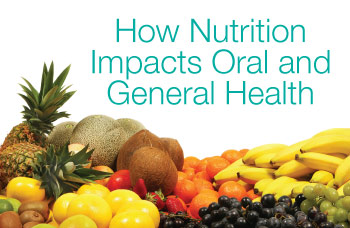Dental health and nutrition
To understand which foods are advisable and which to avoid, it is important to understand the mechanism of caries formation.
Proper nutrition plays a crucial role in maintaining tooth health.
Inside our oral cavity live many bacteria that form colonies on the dental walls, and feed on the food residues that remain in the mouth and between the teeth.
In particular, they prefer sugars, and the waste product of their "meal" is an acid that damages the enamel and creates carious cavities.
To prevent problems with our teeth, here are 12 valuable dietary rules to adopt:
1-Limit sugar intake:
The most harmful sugars are the simple ones, which are now contained in many foods (soft drinks, sweets, cereals ...).
2 - Have adequate oral hygiene:
The more food remains in our mouth, the more the probability of caries formation increases. It is therefore important to clean our teeth daily after meals. Your hygienist will advise you on the most suitable tools for your mouth.
3 - Adopt a balanced diet:
In addition to simple sugars, even complex carbohydrates, contained in many foods (fruit, meat, fish, legumes, etc.) can be dangerous; therefore care must be taken not to exceed. It is also important to introduce foods that contain vitamins and minerals useful for the health of our teeth (calcium,
magnesium, fluorine, phosphorus ...).
4 - Avoid foods that stick:
Foods that stick to our teeth provide energy and protection for bacteria.
5 - Avoid sucking:
Beware of sucking chocolates and candies, so sugars will remain in our mouth for a long time.
6 - Some sugars can help!
Sugars such as fructose and sugar alcohols are good for our diet and avoid being overweight. Even sweeteners like Xylitol fight the action of bacteria and prevent tooth decay. The numerous chewing gums that contain this substance, even if they do not replace toothbrushes and thread, can, therefore, help our teeth.
7 - Attention to growing children:
Until the end of adolescence, you are more exposed to the risk of tooth decay, due to a less mineralized dental constitution and a propensity to sweet foods. It is important, therefore, from birth to avoid bottles with sugary substances, the pacifier with honey, candies and, as already mentioned, sugary foods that stick. It can help educate children's palates by reducing the amount of sugar in home-prepared foods.
8 - Drinking lots of water is good:
Water intake cleans the oral cavity and increases the production of saliva which has a protective action against the teeth and contains substances that fight bacteria. In addition, water is often contained in fluorine, which helps protect tooth enamel. Fluorine is also found in many foods of marine origin. Although this substance is important you have to be careful not to abuse it, too much can cause damage to your teeth.
9 - Few snacks during the day:
Every time we eat the mouth suffers an acid attack, and therefore a person who constantly eats is more prone to tooth decay. If, for example, a child wants a snack, it should be included in one of the 5 recommended daily meals (breakfast, morning snack, lunch, afternoon snack, dinner).
10 - Chewing is good:
Nowadays we are used to making use of many liquid foods (smoothies, herbal teas, mousses, soups) compared to the past. Chewing urges dental remineralization, so it is important to keep it trained especially during growth.
11 - Pay attention to acidic foods and drinks:
Foods like citrus fruits and juices are good and should not be avoided, but contain acidic juices that can demineralize the enamel surface. After taking them, it is advisable to drink water and wait for a little before brushing your teeth to allow water and saliva to restore the correct pH.
12 - Prefer Anti-inflammatory foods and reduce Pro-inflammatory foods:
It is good to choose a diet rich in foods that help our body. Yes to fruits and vegetables of different colors to be consumed during the week, and that includes whole grains (also red or black rice). Encourage the consumption of vegetable proteins, ie legumes, especially red beans, chickpeas, lentils. Reduce the consumption of animal proteins (meat 1 v / week, eggs 1v / week) with the exception of bluefish (2 v / week). Reduce the consumption of blue cheeses and molds, while a teaspoon of parmesan cheese is useful on the first course every day and a glass of skimmed milk or semi-skimmed milk in the morning and/or yogurt with snacks.
___________________________________________________________________________
Information brought to you by Massimo - Write me with your Panoramic X-Rays view for a free specialist diagnosis by sending an email to meditur@costaricabluezone.com
Information brought to you by Massimo - Write me with your Panoramic X-Rays view for a free specialist diagnosis by sending an email to meditur@costaricabluezone.com
DISCLAIMER
The Content above even if the above information is written or supervised by a professional in dentistry. A physical examination is a procedure by which the dentists investigate the oral cavity of patients for signs of disease. -- Together with the medical history, the physical examination aids in determining the correct diagnosis and devising the treatment plan. -- Always seek the advice of your physician or other qualified health providers with any questions you may have regarding your medical condition




Comments
Post a Comment